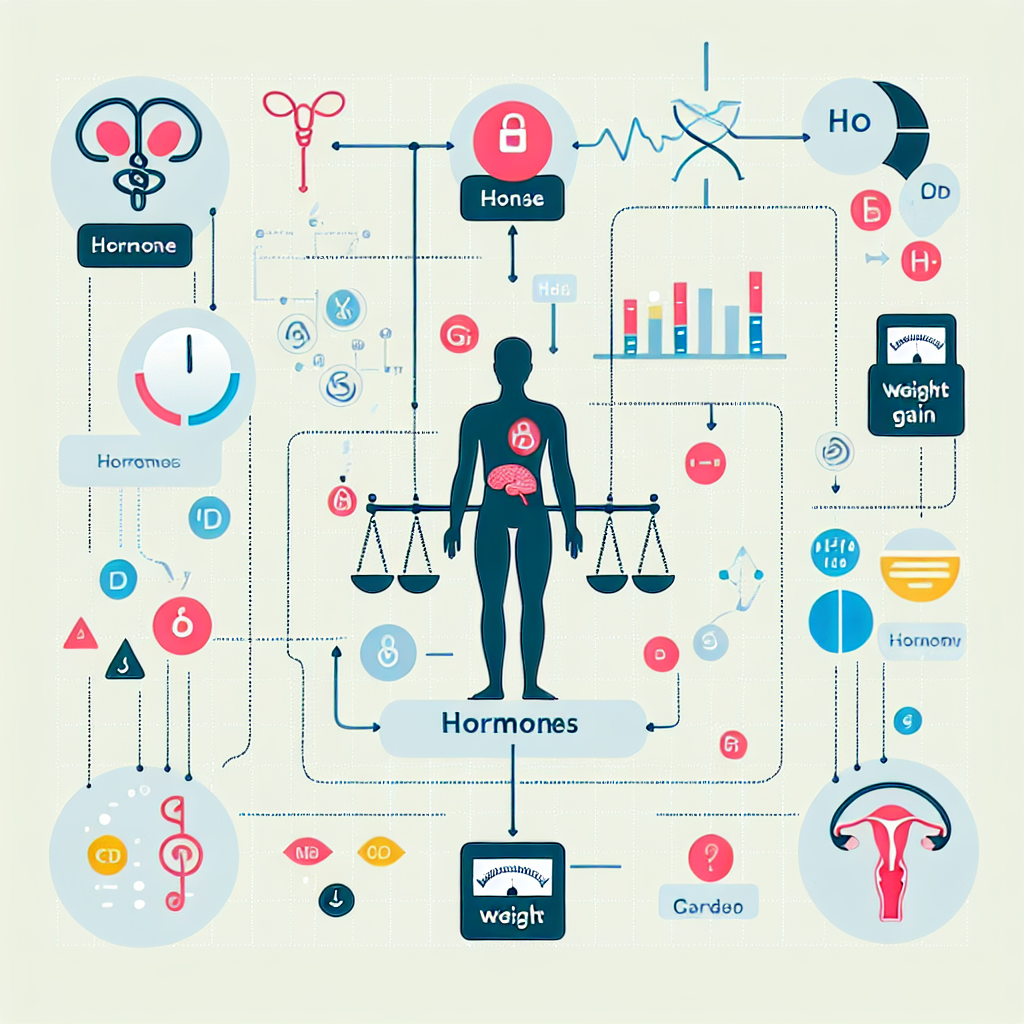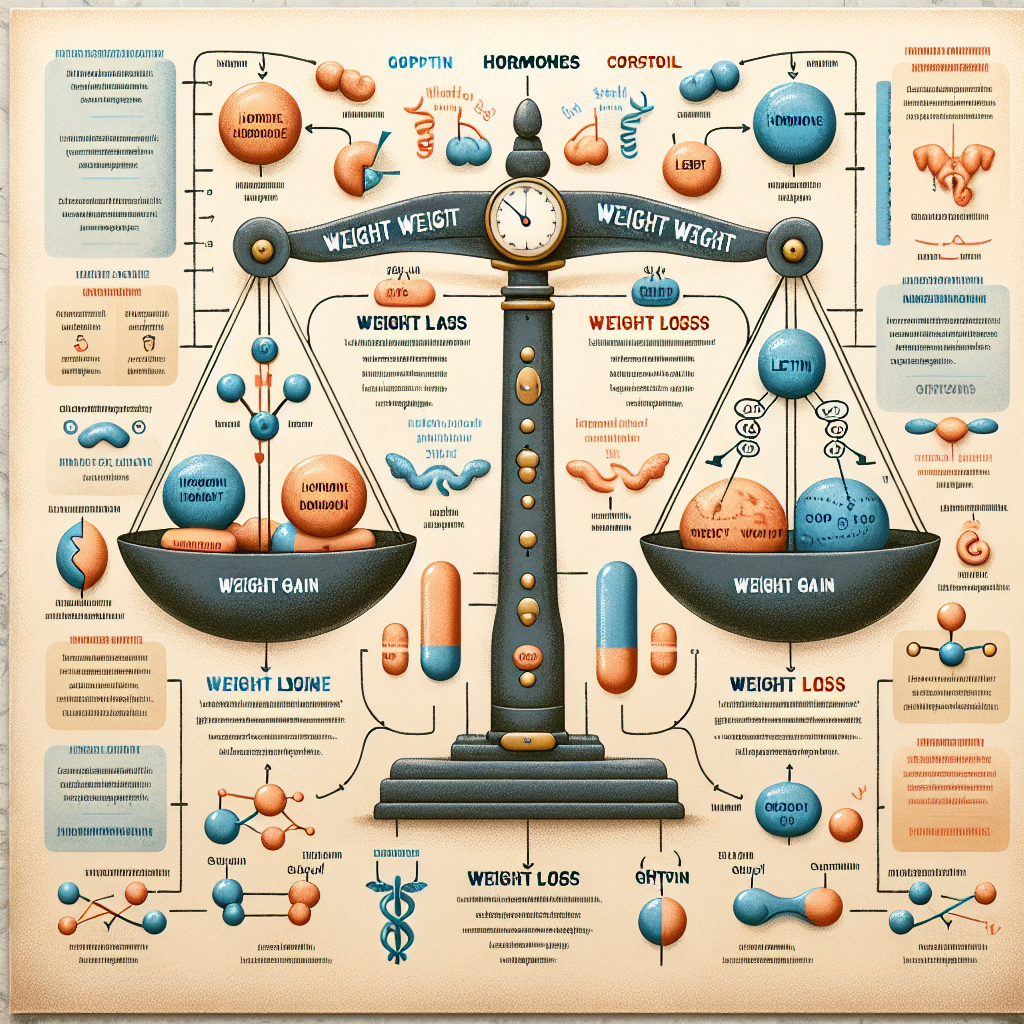The Role of Hormones in Weight Loss and Weight Gain

Discover more about the crucial role of hormones in weight loss and weight gain. Understand how they can impact your health and fitness journey. Visit My Vibrant Vitality now to learn more.
Understanding the Impact of Hormones on Weight Loss and Weight Gain
The role of hormones in weight loss and weight gain is a topic that has garnered significant attention in recent years. As we delve into the intricacies of this subject, it becomes evident that hormones play a pivotal role in regulating our body weight. They act as chemical messengers, influencing how our bodies function, including our metabolism, appetite, and fat storage. Understanding the impact of hormones on weight loss and weight gain can provide valuable insights into managing our weight effectively.
To begin with, let’s consider the hormone leptin, often referred to as the ‘satiety hormone’. Produced by fat cells, leptin communicates with the brain about the amount of fat stored in the body. When functioning optimally, leptin signals to the brain that we have enough fat stored and do not need to eat, thus suppressing appetite. However, in individuals with obesity, the brain may become leptin resistant, failing to receive these signals, leading to overeating and weight gain.
Conversely, ghrelin, known as the ‘hunger hormone’, stimulates appetite and promotes fat storage. Levels of ghrelin rise before meals, signaling to the brain that it’s time to eat, and decrease after meals. However, in some individuals, ghrelin levels may not drop adequately after eating, leading to increased food intake and potential weight gain.
Insulin, another crucial hormone, regulates blood sugar levels by facilitating the uptake of glucose into cells for energy. When we consume foods high in sugar or carbohydrates, our bodies respond by producing more insulin. Over time, this can lead to insulin resistance, where cells become less responsive to insulin, leading to higher insulin and blood sugar levels. This can result in increased fat storage and weight gain, and potentially, the development of type 2 diabetes.
On the other hand, hormones can also aid in weight loss. For instance, peptide YY (PYY), produced in the gut in response to eating, helps reduce appetite and increase feelings of fullness. Similarly, cholecystokinin (CCK), released by the small intestine, also promotes feelings of satiety. Higher levels of these hormones can help control food intake, leading to weight loss.
Moreover, hormones like adrenaline and thyroid hormones play a significant role in regulating metabolism, the process by which our bodies convert food into energy. Adrenaline helps break down fat and glycogen for energy, while thyroid hormones regulate our metabolic rate. An underactive thyroid can slow metabolism, leading to weight gain, while an overactive thyroid can result in weight loss.
In conclusion, hormones play a critical role in weight regulation, influencing appetite, metabolism, and fat storage. Disruptions in hormonal balance can lead to weight gain, while optimizing hormone levels can aid in weight loss. Understanding the impact of hormones on weight loss and weight gain can help individuals make informed decisions about their diet and lifestyle, potentially leading to more effective weight management. However, it’s important to remember that hormones are just one piece of the weight loss puzzle. A balanced diet, regular physical activity, adequate sleep, and stress management are all crucial for maintaining a healthy weight.
Exploring the Role of Hormones in Regulating Body Weight

The role of hormones in weight loss and weight gain is a fascinating area of study that has garnered significant attention in recent years. Hormones, the body’s chemical messengers, play a crucial role in regulating various physiological processes, including metabolism, appetite, and body weight. Understanding the intricate relationship between hormones and body weight can provide valuable insights into the complex dynamics of weight loss and weight gain.
To begin with, it’s important to understand that our body weight is not solely determined by the calories we consume and expend. Instead, it’s a complex interplay of various factors, including genetics, environment, lifestyle, and importantly, hormonal regulation. Hormones such as insulin, leptin, ghrelin, cortisol, and thyroid hormones, among others, play a pivotal role in regulating our body weight.
Insulin, a hormone produced by the pancreas, is primarily responsible for regulating blood sugar levels. However, it also plays a significant role in fat storage. When we consume food, particularly carbohydrates, our body’s blood sugar levels rise. In response, the pancreas releases insulin to help cells absorb this sugar for energy or storage. When functioning properly, this process helps maintain a healthy weight. However, issues such as insulin resistance can disrupt this balance, leading to weight gain and potentially, type 2 diabetes.
Leptin and ghrelin, often referred to as the ‘hunger hormones’, also play a crucial role in weight regulation. Leptin, produced by fat cells, signals to the brain that we are full and should stop eating. Ghrelin, on the other hand, is released by the stomach when it’s empty, signaling to the brain that we are hungry and need to eat. Imbalances in these hormones can lead to overeating and weight gain.
Cortisol, the ‘stress hormone’, can also impact weight. Produced by the adrenal glands in response to stress, cortisol can stimulate fat storage, particularly in the abdominal area. Chronic stress can lead to elevated cortisol levels, which in turn can contribute to weight gain.
Thyroid hormones, produced by the thyroid gland, regulate our metabolism – the process by which our bodies convert food into energy. An underactive thyroid can slow metabolism, leading to weight gain, while an overactive thyroid can lead to weight loss.
In conclusion, hormones play a critical role in regulating body weight. They influence our appetite, metabolism, and where we store fat. However, it’s important to note that while hormonal imbalances can contribute to weight gain or difficulty losing weight, they are often not the sole cause. Lifestyle factors such as diet, physical activity, sleep, and stress management also play a significant role. Therefore, a holistic approach that includes a balanced diet, regular physical activity, adequate sleep, and stress management, along with addressing any potential hormonal imbalances, is the most effective strategy for achieving and maintaining a healthy weight.
Understanding the role of hormones in weight regulation can also help in the development of more effective weight loss strategies and treatments. For instance, medications that target specific hormones are already being used to treat obesity and related conditions. As research in this area continues to evolve, we can look forward to more nuanced and effective approaches to managing body weight.
The Connection Between Hormonal Imbalance and Weight Fluctuations
The role of hormones in weight loss and weight gain is a topic that has been gaining significant attention in recent years. This is largely due to the increasing recognition of the intricate connection between hormonal imbalance and weight fluctuations. Hormones, the body’s chemical messengers, play a crucial role in regulating various physiological processes, including metabolism, appetite, and fat storage. Therefore, any imbalance in these hormones can significantly impact an individual’s weight.
To begin with, let’s consider the hormone insulin, which is primarily responsible for regulating blood sugar levels. When we consume food, particularly carbohydrates, our body breaks it down into glucose, which is then used for energy. Insulin facilitates the absorption of this glucose into our cells. However, when there is an excess of glucose, insulin prompts the body to store it as fat. Therefore, a high insulin level can lead to weight gain. Conversely, insulin resistance, a condition where cells become less responsive to insulin, can also lead to weight gain and even obesity, as the body continues to produce more insulin to compensate for the resistance.
Next, let’s turn our attention to leptin and ghrelin, often referred to as the ‘hunger hormones’. Leptin, produced by fat cells, signals to the brain that we are full and should stop eating. Ghrelin, on the other hand, signals hunger. An imbalance in these hormones can disrupt our sense of hunger and satiety, leading to overeating and subsequent weight gain. For instance, leptin resistance, where the brain does not respond to leptin’s signals, can result in constant feelings of hunger, even when the body has enough energy stored.
Cortisol, the ‘stress hormone’, also plays a significant role in weight management. Produced by the adrenal glands in response to stress, cortisol helps to regulate energy by selecting the right type and amount of substrate (carbohydrate, fat, or protein) the body needs to meet the physiological demands placed on it. However, prolonged stress can lead to elevated cortisol levels, which can stimulate appetite, particularly for high-fat, high-sugar ‘comfort’ foods, and promote fat storage, particularly in the abdominal area.
Lastly, let’s consider the sex hormones, estrogen in women and testosterone in men. Both hormones play a role in fat distribution and metabolism. In women, low estrogen levels, particularly after menopause, can lead to weight gain, as estrogen helps to regulate body weight and metabolism. In men, low testosterone levels can lead to increased body fat and reduced muscle mass.
In conclusion, hormonal imbalance can significantly impact weight fluctuations. Therefore, maintaining hormonal balance is crucial for weight management. This can be achieved through a balanced diet, regular physical activity, adequate sleep, and stress management. However, in some cases, medical intervention may be necessary. Therefore, if you are struggling with weight management despite your best efforts, it may be worth considering a hormonal imbalance as a potential underlying cause and seeking professional medical advice. Remember, weight management is not just about calories in versus calories out; it’s also about the complex interplay of hormones that regulate our metabolism, appetite, and fat storage.